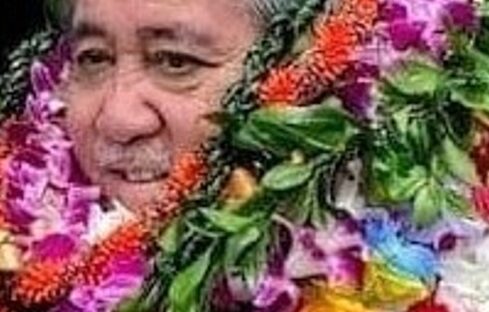The Rev. Kealahou Alika

Let Us Heed the Call to be Pono
I looked at Mary Kawena Pukui’s book of Hawaiian proverbs and poetical sayings (‘Ōlelo No‘eau) and came across her entry of:
Ua mau ke ea o ka ‘āina i ka pono,
which she translated as “The life of the land is preserved in righteousness.” Other interpreters use the word “maintained” or “perpetuated” in place of “preserved.”
When the state motto was adopted on May 1, 1959, it included the word “perpetuated” in its translation. By adopting the phrase as a state motto, its deeper and richer history has been obscured. I imagine many of us memorized the phrase growing up here in Hawai‘i without fully understanding its profound meaning.
As we look back, we discover that some attributed the phrase to Kauikeaouli (Kamehameha III). It was Kauikeaouli who was pressured by Royal Navy officer Lord George Paulet, Captain of the British Navy frigate Carysfort, to sign a provisional deed of cession of the Kingdom of Hawai‘i to England.
Thankfully, Rear Admiral Richard Thomas, Paulet’s superior officer, anchored at Honolulu Harbor in the summer of 1843. Five months had gone by since Paulet’s usurpation of the kingdom. Thomas restored Hawai‘i’s independence based on Queen Victoria’s already existing policy of non-intervention in the affairs of the kingdom.
On July 31, 1843, the Hawaiian flag was raised again over the Hawai‘i. It was from the steps of Kawaiaha‘o Church that Dr. Gerrit Judd read in English and Hawaiian a proclamation from Kauikeaouli highlighting the words of would eventually be adopted and appear on the coat of arms of the Kingdom of Hawai‘i in 1845.
When the Republic of Hawai‘i was established in 1894 following the overthrow of the kingdom by American business interests, it was included on the official seal for the republic. In 1900, when Hawai‘i was annexed as a U.S. Territory, it was included on the seal as a motto for the territory. In 1978, the adoption of the motto appeared in the Constitution for the State of Hawai‘i (Article 15, Section 5).
Some attribute the saying to the sacred wahine ali‘i Keōpūolani years earlier in 1825 when she was baptized into the Christian faith. Whatever the case may be, others like historian Christopher L. Cook, contend that the use of the phrase Ua mau ke ea is one that may be attributed to verses that appear in the Hawaiian language Bible. He refers to Isaiah 42:5.
For Cook “life of the land” is defined as spirit, as the breath of life.” (Obookiah.com, Christian History of Hawai‘i Books).
“Thus says God, the Lord, who created the heavens and stretched them out, who spread out the earth and what comes from it, who gives breath to the people upon it and spirit to those who walk in it.” (Isaiah 42:5)
Cook references the work of Thomas D. Murphy, Professor Emeritus of History at UH Manoa and his analysis of the phrase and points to other verses from the Bible, including Proverbs 11:30, 12:28 and 12:84 and Deuteronomy 9:4–6 that Murphy contends appear in the speeches given by Kauikeaouli.
Beyond Cook’s assessment that life is also “breath” or “spirit,” there is the greater allusion to the words of the prophet Isaiah that follows in verses 6, 7, 8 and 9. Isaiah calls on the people to open the eyes of the blind and to bring out those who sit in darkness and to be a light to the nations (Isaiah 42:6–7).
It makes sense, then, that the word pono is inherent in the phrase. By definition, Mary Kawena Pukui and Samuel Hoyt Elbert, creators of the first Hawaiian dictionary, gave the word six meanings and 83 English translation equivalents.
We would do well to take heed of the call to be pono knowing that pono is defined as, among other things – “goodness, uprightness, excellence, welfare, benefit, behalf, equity, moral, fitting, proper, right, fair” – but more especially “to do what is right, to do what is just.”
All of this is to say, “the life of any land must and should be perpetuated, preserved and maintained in pono (justice and righteousness).”
The Rev. Kealahou Alika retired in February 16, 2020 as the pastor of Keawala’i Congregational Church – United Church of Christ (USA), Makena, Maui having served the church for 29 years. He currently serves as an officer of the Hawai’i Conference Foundation of the Hawai’i Conference – United Church of Christ; as an officer for the State Council of Hawaiian Congregational Churches; and as a member of the Reconciliation Working Group of the Hawai’i Conference (UCC). He previously served as the Executive Director for what was then known as the Pacific & Asian American Center for Theology & Strategies in Berkeley, California from 1979 – 1985 and later as an Administrative Assistant for Mission & Evangelism for the Presbytery of San Francisco, Presbyterian Church USA from 1986 – 1991.
